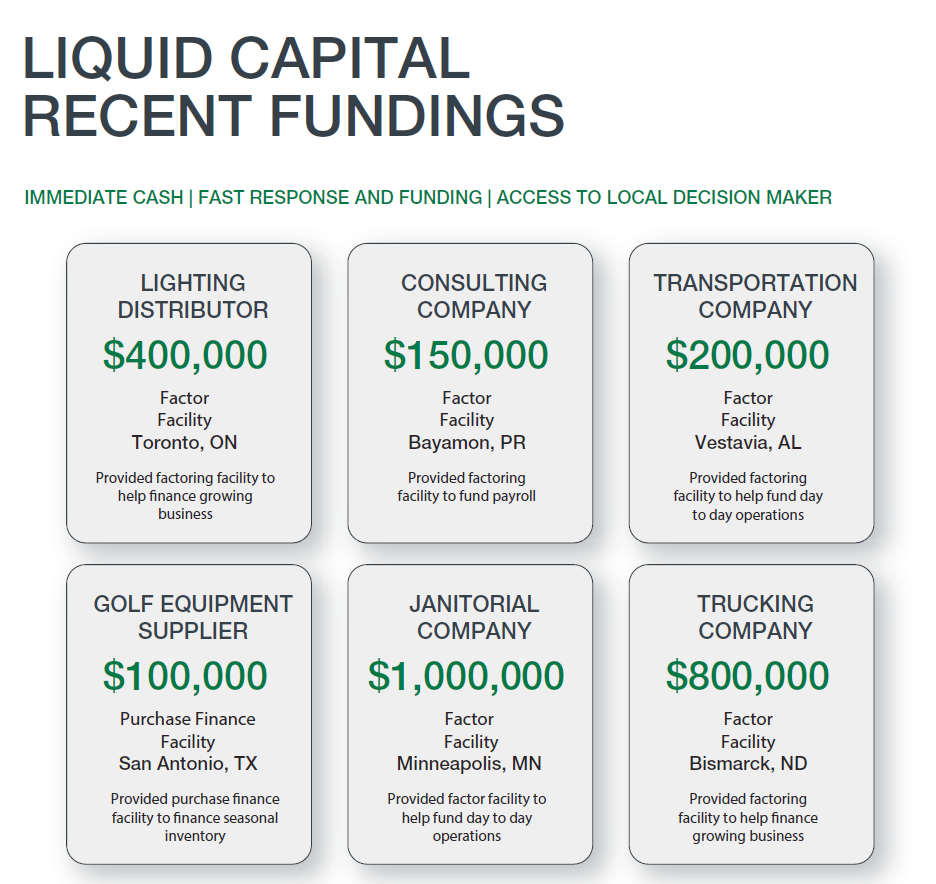Flexiti Financial («Flexiti»), empresa canadiense de tecnología financiera que ofrece financiamiento al consumo en puntos de venta, se complace en anunciar que ha suscrito un acuerdo con Liquid Capital Corporation («Liquid Capital»), empresa especializada en proporcionar capital de trabajo, préstamos basados en activos y soluciones de financiamiento al comercio. Conforme al acuerdo, Liquid Capital proveerá deuda preferente para una nueva línea de crédito, inicialmente por un monto de hasta $25 millones, destinada a cuentas por cobrar de consumidores generadas por Flexiti Financial. La línea de crédito se utilizará para financiar el depósito de cuentas por cobrar originadas por Flexiti que están pendientes de bursatilización.
Flexiti Financial, que inició operaciones en 2014, les brinda a vendedores minoristas, contratistas de mejoras del hogar y profesionales de la salud la capacidad de ofrecer a sus clientes la opción de pagar compras considerables de bienes o servicios ya sea en parcialidades iguales o en una fecha posterior, con la finalidad de hacer que las compras sean más asequibles para el consumidor. Flexiti ha desarrollado una plataforma de tecnología galardonada que les permite a los clientes obtener una tarjeta de crédito virtual en cuestión de minutos y hace que el proceso de solicitud y aprobación sea rápido y sencillo. Tras llevar a cabo una financiación de capital por más de $5 millones en 2014 y otros $4 millones en financiamientos de deuda subordinada en 2015, Flexiti acaba de disponer de $2 millones adicionales en capital operativo y muy pronto realizará un aumento de capital para dar apoyo a su pujante actividad de financiamiento al consumo. Este capital fresco, junto con su línea de depósito de cuentas por cobrar, colocará a Flexiti en condiciones de financiar su incesante crecimiento en todos los segmentos del mercado, así como una ampliación planificada en otros productos y servicios.
«Nos complace haber conformado una asociación de financiamiento con Flexiti Financial», expresó Sol Roter, Presidente y cofundador de Liquid Capital. «La plataforma de tecnología galardonada de Flexiti y las asociaciones con comerciantes que ha establecido tienen un enorme potencial para la creación de activos financieros de calidad. Esta transacción representa una importante ampliación a la cartera de Liquid Capital y ofrece una excelente oportunidad para mostrar el compromiso cada vez mayor de Liquid Capital en el ámbito de los préstamos basados en activos».
En 2015, Liquid Capital suscribió un acuerdo de empresa conjunta con Next Edge Capital Corp. («Next Edge») con el fin de cofinanciar inversiones en cuentas por cobrar, financiamiento al comercio y transacciones crediticias basadas en activos aportadas por y a través del canal de distribución principal de Liquid Capital y financiadas por el Next Edge Private Debt Fund (el «Next Edge Fund»). El Next Edge Fund ha crecido hasta alcanzar aproximadamente $40 millones y seguirá creciendo conforme Liquid Capital sigue aportando transacciones de calidad a través de su red de originadores en Canadá y Estados Unidos.
«Flexiti Financial se complace en anunciar la creación de esta nueva línea de crédito», dijo Peter Kalen, fundador y Director Ejecutivo de Flexiti Financial. «Hemos buscado a un socio financiero con acceso al capital en condiciones flexibles para respaldar el crecimiento de nuestras actividades y que nos permita construir nuestra cartera de activos incluidos en el balance general con fines de bursatilización. Liquid Capital, a través de su asociación con Next Edge, brinda la fortaleza y la visión que estamos buscando para dar un fuerte impulso a nuestras actividades. Con esta nueva asociación de financiamiento, estamos seguros de que nuestra solución de tarjeta de crédito instantánea y 100% virtual puede seguir expandiéndose rápidamente en Canadá y, con ello, nuestros cerca de 1000 socios comerciales tendrán la capacidad de expandir sus ventas ya que las compras grandes serán más asequibles para los clientes de estos últimos».
En esta transacción, INFOR Financial Inc. actuó como asesor financiero de Flexiti Financial, y Raymond James Ltd. fungió como asesor financiero tanto de Liquid Capital como de Next Edge.
Actualmente, Flexiti Financial opera en Columbia Británica, Alberta y Ontario, Nueva Brunswick, Terranova y Nueva Escocia. Si le interesa ofrecer financiamiento Flexiti a sus clientes, póngase en contacto con nosotros en sales@flexitifinancial.com o llámenos al 1-855-559-0909.
Acerca de Flexiti Financial:
Flexiti Financial (antes Wellspring Financial), empresa canadiense de tecnología financiera que opera en el ámbito del crédito al consumo mediante puntos de venta, está dirigida por un experimentado equipo de ejecutivos con amplios conocimientos sobre el sector del crédito minorista en Canadá y que aprovecha la tecnología móvil para ofrecer el proceso de solicitud más rápido del mercado. Es la única empresa de tecnología financiera del sector del crédito al consumo que compite directamente con las grandes instituciones financieras y que ofrece una solución de tarjeta de crédito minorista de marca privada. La plataforma tecnológica fue reconocida como líder en el mercado y obtuvo el Premio 2015 a la Innovación Tecnológica ACT (Tarjeta de Tecnologías Avanzadas) de Canadá por Pagos que Benefician a los Consumidores, así como el Premio a la Innovación Tecnológica, Plata 2015, por Pagos que Benefician a los Comerciantes Canadienses.
Para obtener más información, visite www.flexitifinancial.com.
Acerca de Liquid Capital:
Desde 1999, Liquid Capital Corporation ha operado en el sector del factoraje y el financiamiento al comercio. Desde esa fecha, la empresa ha procesado más de $2 mil millones en cuentas por cobrar y operaciones de financiamiento al comercio, tanto a través de sus oficinas canadienses en Toronto como de su sede en Dallas, Estados Unidos. Asimismo, la empresa tiene una relación de franquicia maestra en México. A través de su red de más de 80 oficinas franquiciadas, la empresa inicia, administra y financia localmente cuentas por cobrar, préstamos basados en activos y transacciones de financiamiento al comercio. Puede encontrar más información enwww.liquidcapitalcorp.com.
Acerca de Next Edge Capital:
Next Edge se constituyó en 2014 a raíz de una escisión administrativa de la oficina canadiense de Man Investments Canada Corp. El equipo de gestión abrió la oficina canadiense de Man Group plc. («Man») en 2006 y ha captado más de CDN $1.0 mil millones desde esa fecha.
Next Edge busca en todo el mundo gestores y estrategias de inversión cuyo objetivo sea ofrecer una rentabilidad sólida ajustada al riesgo. Las personas y los enfoques que descubrimos podrían ser poco conocidos en Canadá, pero creemos que ofrecen algo extraordinario: acceso a lo que está por venir. Actualmente, los rendimientos que ofrecen las inversiones de renta fija tradicionales se ubican en los niveles más bajos de la historia. Un área en la que aún existen oportunidades para generar rendimientos seguros e importantes es la deuda privada. Con nuestras dos primeras ofertas en este espacio –el Next Edge Private Debt Fund y el VPC Specialty Lending Trust– Next Edge busca capitalizar esta oportunidad. Nuestros clientes aprecian ver nuevos enfoques convincentes, pese a que algunos son complejos o presentan una capacidad limitada. Desde hace más de una década, el equipo administrativo de Next Edge ha brindado acceso a estrategias únicas antes de que pasen a ser ampliamente conocidas. Puede encontrar más información en www.liquidcapitalcorp.com.
SOURCE: Flexiti Financial
Para mayor información: Flexiti Financial: Peter Kalen, Director Ejecutivo, pkalen@flexitifinancial.com, (416) 583-1861; Liquid Capital: Sol Roter, Liquid Capital Corporation, sroter@liquidcapitalcorp.com, (416) 222-5599 ext. 8185










